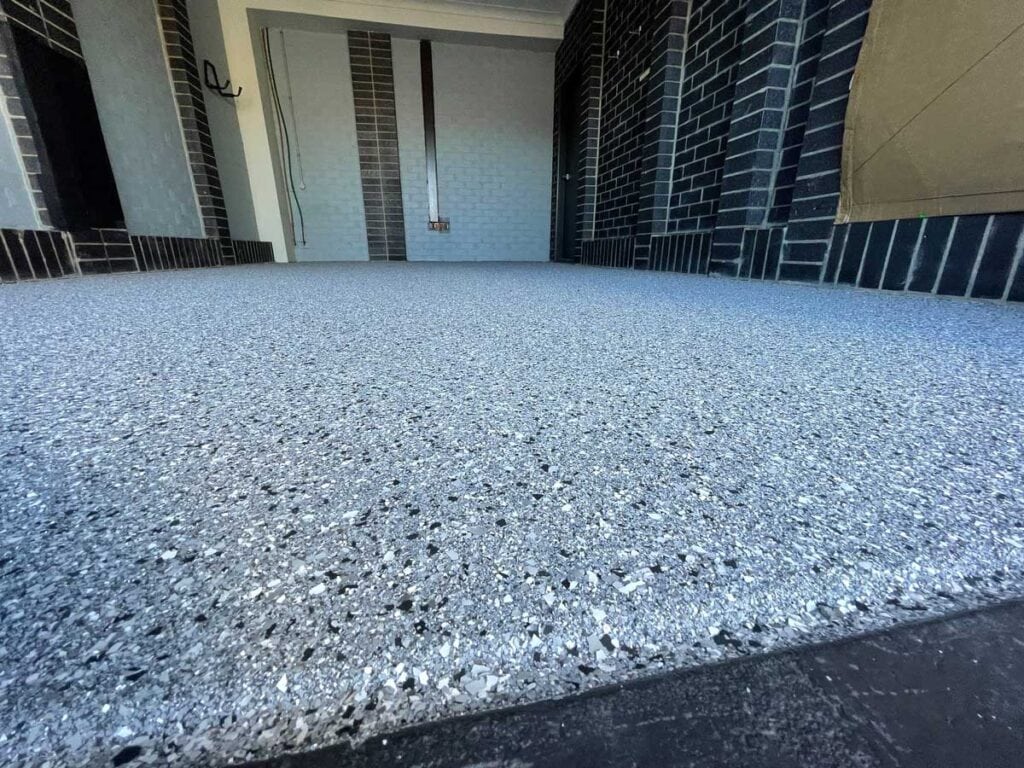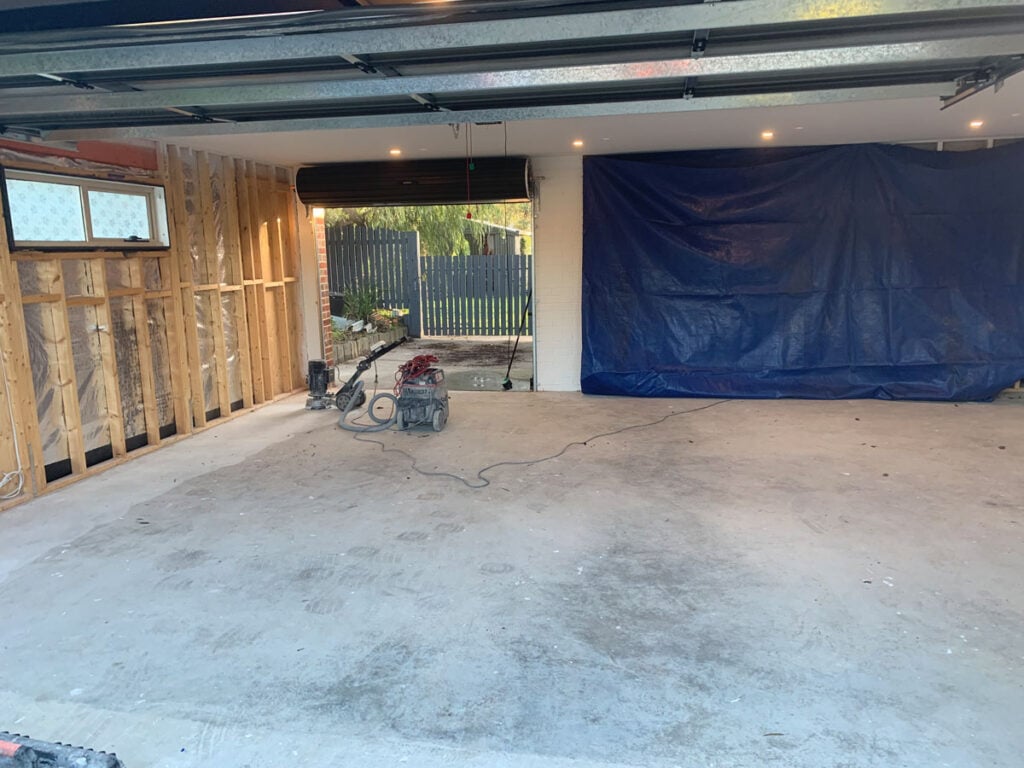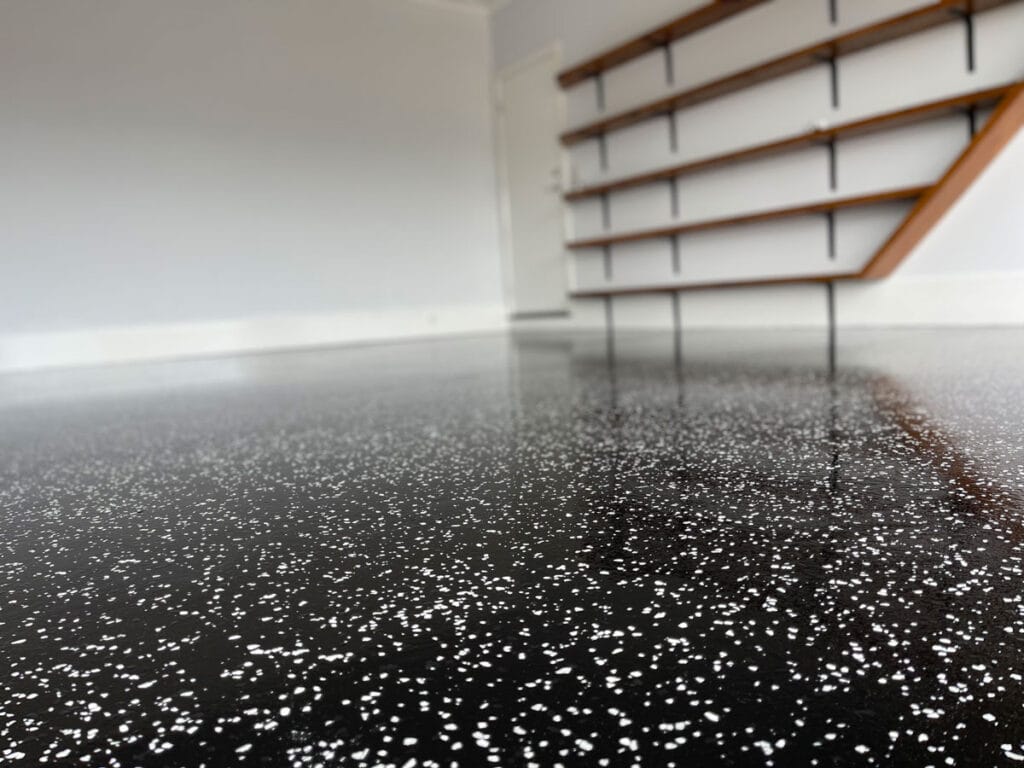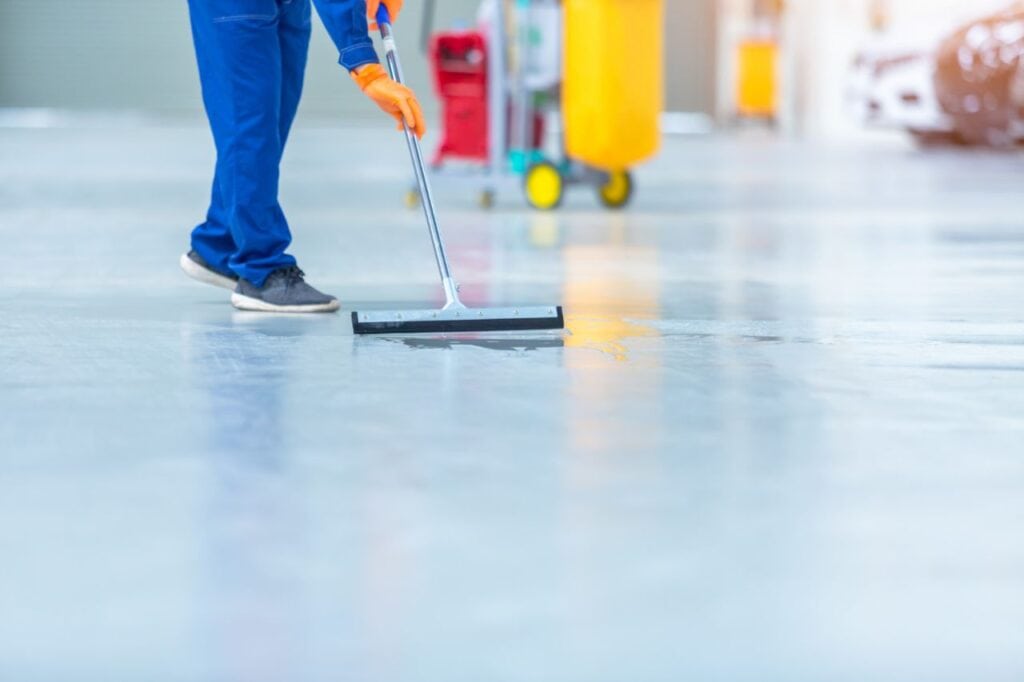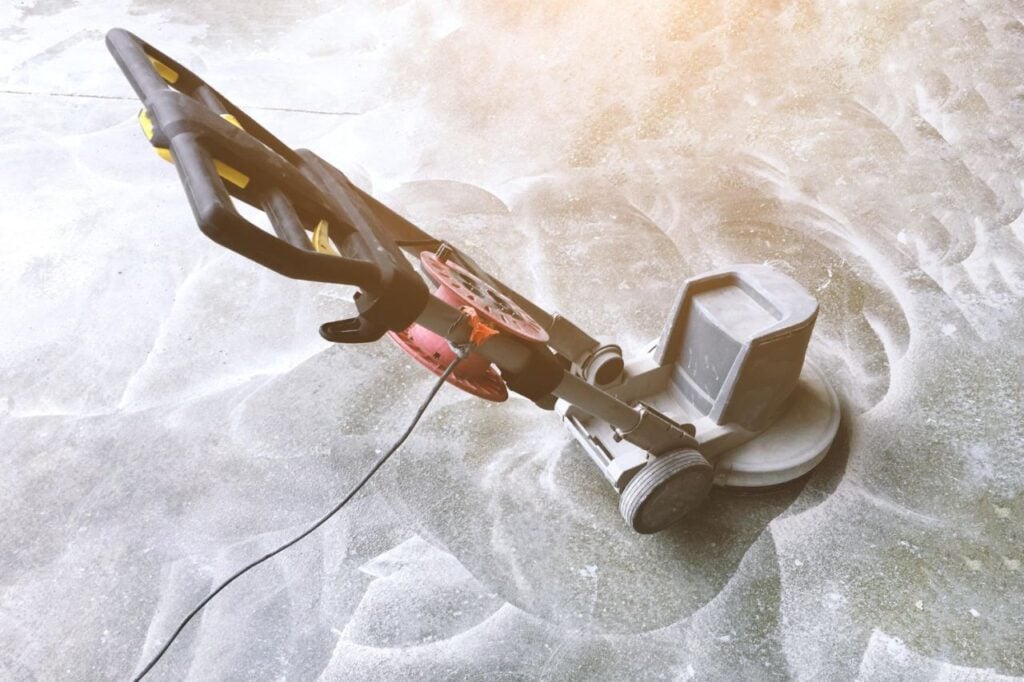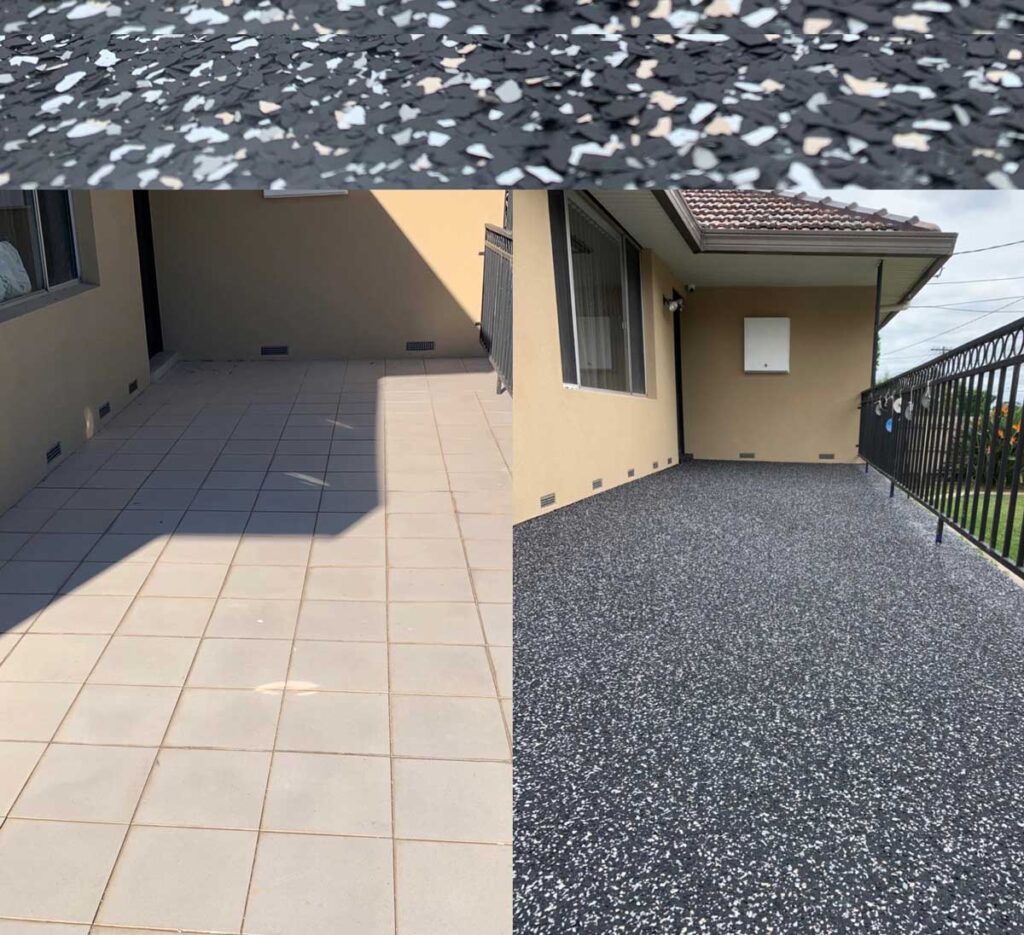Typically, epoxy flooring lasts 2 to 3 years in heavy traffic. Commercial properties—like garages, restaurants, or factory spaces—with lots of daily foot traffic can expect this experience. However, with proper care and maintenance, your epoxy flooring may last much longer.
- Strong Application Fumes. During the epoxy application process, wet epoxy gives off an unpleasant smell. ...
- Long Curing Time. ...
- Slippery When Wet. ...
- Economical Flooring Choice. ...
- Resistant to Damage. ...
- Weather-withstanding. ...
- Aesthetically Pleasing. ...
- Protects and Decreases Wear & Tear.
Extremely safe – Epoxy is a very safe coating for your hard floors. It's slip resistant, shock resistant, and less abrasive than concrete and other types of industrial flooring. ... It can also withstand heat of up to 200 degrees, making it a better choice than most other types of flooring when it comes to fire resistance.
You've done your homework and come to the conclusion that epoxy flooring is the best option for either your residential or commercial property. Congratulations! It is time to start looking for a reputable epoxy flooring contractor so that your new floor may be installed. Sadly, this is simpler to say than it is to actually accomplish. Epoxy coatings require the skills of specialized technicians in order to be installed correctly. Flooring that has been improperly installed will not withstand normal wear and use will be more prone to breaking and damage, and will ultimately reduce the value of your property.
The application of epoxy paint is required for epoxy coating. It is an excellent choice for use as a floor coating solution in a garage, on a patio, or in a basement. Epoxy-coated floors offer greater resilience to grazing and scratching than uncoated floors. They will perform far better when put through the rigors of regular use and the regular wear that results from this. The application of an epoxy floor coating is an excellent choice for flooring in high-traffic areas that are also likely to have concrete floors that will be subjected to a significant amount of wear and tear.
Because of this benefit, it is frequently utilized in food establishments, showrooms, retail centers, plant and equipment rooms, academic institutions, and storage facilities. The coating of an epoxy floor offers benefits not only in terms of aesthetics but also in terms of hygiene. Epoxy-coated floors are more convenient to clean and continue to present a pleasant appearance in spite of heavy foot traffic.
We have compiled a few pointers in the hope that they will assist you in finding an epoxy flooring contractor that you can have faith in. Have a look at them down below.
Before You Start Your Search
Before you start looking into the various flooring contractor alternatives available to you, you need to have a clear idea of the specific type of flooring you need and the features (such as longevity, resistance to slipping, and appearance) that will be the most beneficial to your area. Because epoxy coating can be installed both inside and outside of domestic, business, and industrial properties, it is essential that you have a clear understanding of the what, where, and why before you move on.
Before making contact with an epoxy flooring company, it may be helpful to have the following questions answered:
- Where exactly will my epoxy flooring be put, and what kind of surface will it be attached to underneath it?
- How much foot traffic can be expected on my epoxy floor?
- Am I interested in a certain style or a certain kind of finish?
- Do you have a hard and fast deadline for the installation?
- Is there a set of principles or criteria that I have to abide by, such as regulations for health and safety in the workplace?
How To Find The Right Epoxy Flooring Business
Check Reviews
Reading the reviews and testimonials that previous customers have left for a business is one of the most effective ways to discover whether or not the business in question has a good reputation. On their websites, the websites of some contractors will feature testimonials from actual clients. It is also a good idea to look at the reviews on Google and the pages on social media of the company. You should probably avoid a company if the vast majority of the reviews that have been posted about it have been critical.
Look At Past Work
It is quite important to pick a company that has a good reputation; nevertheless, it is also a good idea to check through their project portfolio in order to judge the quality of their work for yourself. Pay careful attention to former careers that are comparable to what you seek.
Don’t Forget Safety
Epoxy is not only a beautiful and long-lasting material, but its resistance to slipping is one of its major selling points. Make sure that the resin flooring contractor you engage with complies with the stringent safety standards that are in place in Australia. Here are two things that you should watch out for:
- Slip-resistant coatings must comply with Australian Standards AS 3661.1 (1993), AS 4586, and AS 4663 (2004).
- Pharmaceutical, hospitality, warehousing, and food and beverage processing projects must meet the OH&S standards set by HACCP, TGA, AQIS, and Food Safe.
FAQs About Reliable Epoxy Flooring Contractor
How Much Does It Cost To Hire Someone To Epoxy Garage Floor?
In settings like residential garages, epoxy represents one of the more cost-effective material choices. On average, you can anticipate spending anywhere from $3 to $7 per square foot of space.
What Are The Disadvantages Of Epoxy Flooring?
- Negative Aspects of Epoxy Flooring
- Strong Smells from the Application During the process of applying epoxy, wet epoxy emits a scent that many people find offensive.
- Long Curing Time.
- When wet, the surface is slick.
- Option for Flooring That Is Cheaper.
- Protected from being damaged.
- Weather-withstanding.
- Appealing to the senses in a visual way.
- Protects and reduces the amount of wear and tear.
How Long Does Epoxy Coating Last?
When installed in areas that see a lot of foot traffic, an epoxy floor will normally last between two and three years. In the case of commercial real estates, such as garages, restaurants, and factory spaces, this will be the situation.
Epoxy flooring can, however, have a longer lifespan provided it is properly maintained. Floor coatings made of epoxy or resin will have a substantially longer lifespan in residential settings with minimal foot traffic. If you keep your epoxy flooring clean and give it regular maintenance, you will get the most use out of it. Our professional epoxy floor coating for residential properties in Melbourne comes with a warranty that is valid for up to 5 years.
Is An Epoxy Countertop Worth It?
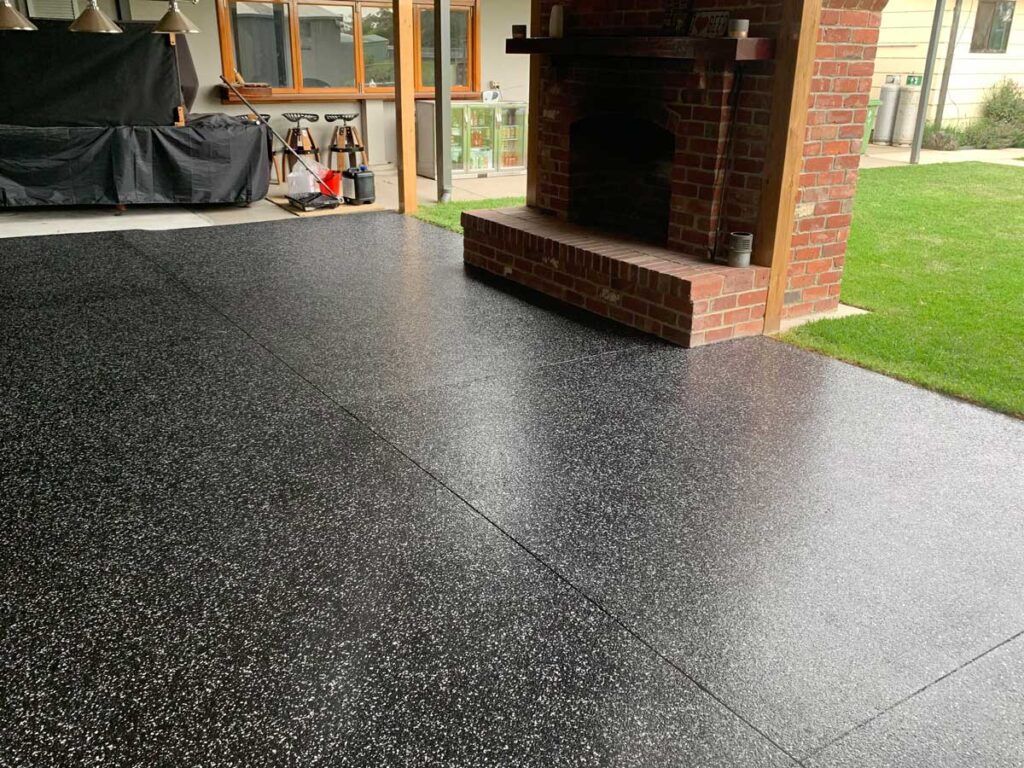
When applied correctly by an experienced painter in Melbourne, an epoxy coating has the potential to produce a finish that is hardy and long-lasting. Because the adhesive is non-porous and has high resistance to moisture, it is a good candidate for use on countertops. The ability of epoxy floor coating to withstand high temperatures makes it a natural choice for usage in tabletop applications. However, you should take care not to set anything hot on your resin countertops.
Does Epoxy Coating Scratch Easily?
Yes. A common problem with the epoxy coating is that it scratches and stains easily. There are additional epoxy compounds that are more prone to changing color over time. Talk to one of our highly trained painters about getting some professional advice on the best adhesive products to apply to the various surfaces in your home. Scratching and stains can leave horrifying markings on your surfaces, especially as they get older. These marks will become more noticeable with time.
Will Epoxy Coating Get Slippery When Wet?
The epoxy coating may not be as fluid as we believe it to be, particularly if it is completed to a high standard, despite the fact that it appears to be slippery. Even when the flooring is wet, an epoxy coating can be improved with skid-resistant ingredients that are applied to the topcoat. This makes the epoxy floor less slippery and safer to walk on. Epoxy-coated flooring that does not have anti-slip additives can become hazardously slippery when immersed in water, especially if oil spills occur on the surface.
Can Epoxy Coating Be Used Over Laminate Countertops?
Yes. Renewing your concrete countertops and giving them a like-new appearance can be accomplished in a frugal and time-efficient manner by applying an epoxy coating. Epoxy coatings, when properly applied by our skilled epoxy coating experts, will help your laminate floors look more appealing and polished, in addition to making them more durable.
Can Epoxy Coating Be Used Outdoors?
Yes. The epoxy floor covering can be utilized even in outdoor settings. Epoxy floor coatings have a proven track record of reliability when applied to outdoor surfaces. This is primarily attributable to their long-lasting nature as well as their exceptional resilience to wear and abrasion. However, it is essential to keep in mind that products made with epoxy will turn yellow over time if they are exposed to ultraviolet radiation.
Even epoxy compounds that are resistant to UV deterioration can degrade more quickly if they are exposed to sunlight. However, this degeneration is only visible to the naked eye. The flooring's functionality is not affected, but its appearance is severely damaged as a result. If you don't mind a little bit of discoloration on your epoxy flooring, you can utilize hard-wearing epoxy floor materials for your outdoor surfaces without any worries.
Where Can I Use Epoxy Floor Coating?
Epoxy floor coating is versatile and can be applied to a variety of floor surfaces, including those found in groceries, commercial kitchens, parking lots, restaurants, automotive manufacturing, workshops, bakeries, colleges, and slaughterhouses, to name just a few possible applications.
How Much Does Epoxy Floor Cost?
Epoxy flooring is an excellent choice for anyone looking to construct a long-lasting ground level that is exceptionally resistant to the effects of foot traffic. In spite of the fact that it was at one time utilized solely in commercial and industrial settings, it is now regularly discovered in garages and residential houses.
In general terms, the pricing range is anywhere between $30 and $70 per square meter. This cost does not come into effect until after the surface has already been prepared. Depending on the state that the floor is in currently, the expenditures associated with preparation could be rather high.
In the following paragraphs, we are going to discuss the cost of flooring in Melbourne, as well as the elements that contribute to this cost. Customers are provided with a price per square meter that takes into account both the cost of installation and the price of the material, which makes things somewhat simpler to comprehend overall.
Does Epoxy Floor Coating Crack?
The different types of epoxy materials each have a maximum number of stresses that they can tolerate. For instance, the epoxy floor coating might break if this threshold is exceeded due to an excessive amount of slab movement, impact, or heat stress. Other potential causes of cracking include:
How Long Will The Epoxy Floor Smell Persists?
After it has been applied, the scent of the epoxy floor coating might linger for anywhere from one to three days. The epoxy contains a number of volatile organic compounds (VOCs), which are the source of the pungent odor that is being given off by the floor coating. These substances can cause irritation to the eyes, throat, and nose, and they pose a potential risk to the health of other the body's organs as well. Therefore, after installing epoxy floor covering, it is strongly advised that you leave the location for a few days so that the coating can dry and the smell may dissipate. During this time, the coating will not smell as strongly.
Can Epoxy Floor Coating Be Used Over Tiles?
Epoxy floor coatings are applied over tiles, although this application needs more extensive preparation to fill up the drummy sections and grout lines before the new floor coating can begin. Despite the fact that epoxy floor covering can be sprayed over tiles,
Is This Floor Worth It?
It is an excellent method for applying a finish that gives an old or new surface layer the appearance of having been professionally done without spending a fortune.
In spite of the fact that it is commonly associated with use in garages and industrial settings, it can be constructed in a number of different ways to make it appropriate for a variety of home settings. It is common sense to apply epoxy to a surface that already consists of concrete if there is already one there.
Epoxy as a finish is another option that might prove to be a good choice. Epoxy is among the most flexible products available on the market, and it may be used to make flooring that is resistant to slipping. When compared to the other available choices, repair and maintenance are hardly ever required.
Factors Impacting The Price Of Epoxy In Melbourne
Resin flooring in Melbourne has a price that is determined by a number of different elements. In order to receive a more accurate quotation, you will need to get in touch with a local service provider. However, the following are the primary aspects that will have an effect on the total cost:
- Work on preparation: If your concrete has not been prepared, and you require services related to concrete grinding, this is a completely separate fee that is absolutely necessary. This price is higher than what an epoxy finish would set you back. Even if you don't require concrete grinding, you may still need to perform a variety of preparation work, such as finding a solution to the problem of moisture and vapor transfer.
- Total surface area: It should come as no surprise that the more the total surface area, the higher the price will be. On the other hand, larger areas might qualify for a price reduction, which would make the whole cost more manageable. It is possible that you will be charged $60 for the first one hundred square meters, $45 for the next one hundred square meters, and $30 for each square meter after that.
- Customers who are looking for flooring that has an aesthetically pleasing design have access to a wide variety of distinct design possibilities. The cost of this will vary according to the level of complexity that you require it to have. When compared to flooring with a normal uniform design, designer flooring will usually cost you an additional $10–15 per square foot.
- Multiple coatings: It's possible that you'll require a surface that's somewhat thicker, which will drive up the price. Your service provider will be able to provide guidance regarding the thickness that is most suited.
The price that you pay will also be affected by factors such as your area and the service provider that you select. The excellent news is that this kind of flooring may be used for over 30 years and only requires minimum upkeep after that.
In comparison to other possibilities, they are very inexpensive, and you have a great deal of leeway in selecting the type of flooring that will be installed in your home.
What Is The Cost Of An Epoxy Floor In Melbourne?
In Melbourne, the pricing range is anywhere from $30 to $70 per square meter. But keep in mind that this is just a preliminary estimate, and the actual dynamic range will differ based on the specifics of your project. The following table will provide you with an estimate of the cost of your flooring installation based on the square footage of the area you want to cover as well as the design you select. Even though it is just a rough suggestion, it should be able to give you some idea of the prices that might be offered to you in Melbourne.
In the event that no additional work is required, you could expect to pay between $1,000 and $1,500 for a conventional modest room. However, keep in mind that these costs only reveal part of the picture. It is highly recommended that the existing state of the floor be evaluated by a trained specialist. In the event that concrete preparation services are required, the following costs can easily be increased by a factor of two. Concrete grinding and repair are typically two distinct processes.
What Is The Cost Of Maintenance And Repair?
The fact that this kind of flooring requires hardly any repair or maintenance at all is among its most significant advantages. These floor surfaces are constructed to resist significant amounts of foot traffic and to last for a very long time. These are non-porous surfaces that are resistant to heat, cold, and the vast majority of chemicals. All that is required of you is to wipe them down with a gentle cloth from time to time. Acetone can be used to eliminate any marks that are visible. The costs of upkeep are virtually nonexistent.
When it comes to repairs, this typically entails nothing more than applying another coat of epoxy. Because most flooring already comes with two coats, this is something that can be done at a lower cost. However, you should not have to apply this additional layer at any time in the near future. They are built to last for thirty years, so you won't need to worry about the expense of repairing or replacing them during that time.
How Can I Reduce The Cost?
You have a lot of different choices available to you that can help you cut costs. Just a few of them are as follows:
- Find a service provider with years of expertise who can accomplish the greatest work at the lowest possible cost.
- Choose one of the conventional alternatives rather than going with fancy flooring.
- Spread the flooring out over a bigger surface area so that you can pay the lowest possible price per square meter.
- You should start by having the concrete prepped, or you should locate an economical firm to do this in preparation.
- Conduct research on both direct and indirect expenditures in order to avoid going over budget.
Keep in mind that lowering costs is not necessarily the same as lowering financial outlays. For instance, if you want to avoid fast having to replace the flooring in your home, it's usually best to go for higher-quality flooring that can endure for thirty years. Products that have a lifespan like this typically more than pay for themselves due to their durability. You will also spend less on repairs and maintenance.
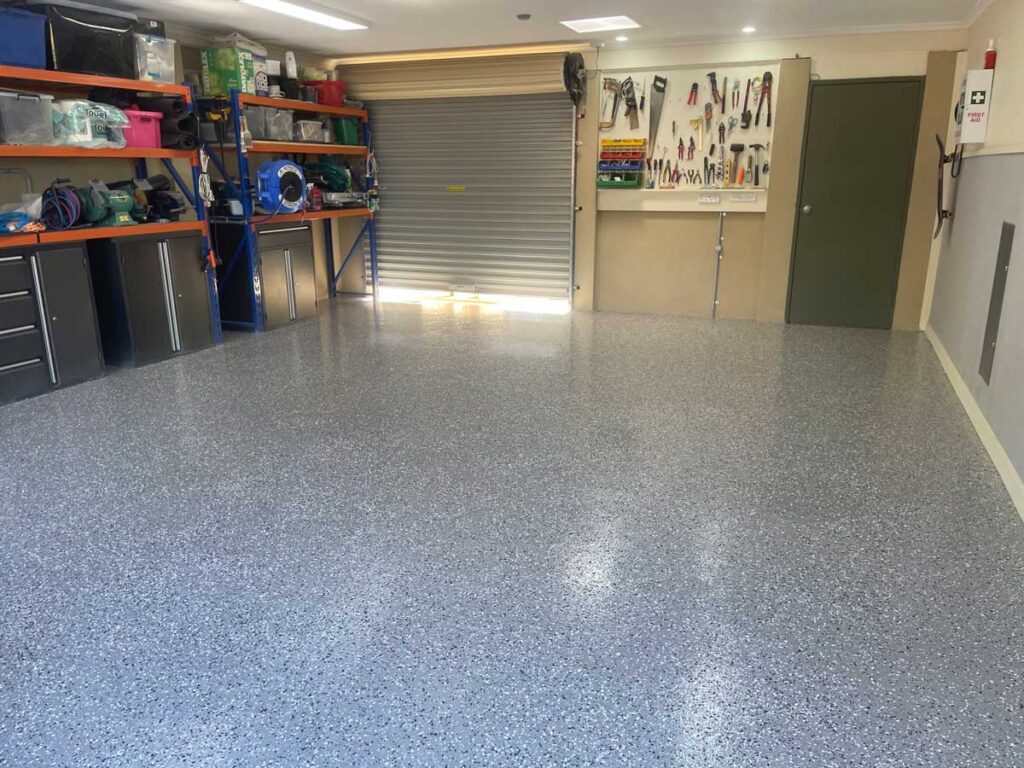
Think about the differences between flooring made of wood and those made of epoxy. The majority of timber varieties require periodic care and should be replaced every 5–15 years. If you choose a realistic strategy, you will get more bang for your buck over the course of the long term.
What Are The Different Types Of Epoxy?
Different kinds are helpful in a variety of contexts for a variety of reasons.
- Self-leveling: These are intended to be installed over cracked or broken concrete floors in order to create a leveled texture and a polished appearance. They are also designed to be placed over uneven concrete surfaces.
- Anti-static: These are made to withstand electrical charges by adding a substance to the epoxy, which gives them their anti-static properties.
- Quartz-filled: These items have a blend of high-grade epoxy polymeric material and quartz grains that have been tinted for a more elegant appearance.
- Epoxy mortar is the most durable variety of epoxy and is made up of 100 percent solid epoxies in addition to quartz or grading sand.
- Epoxy flake floors are designer resin floors that come at a premium price due to the addition of flake materials to the epoxy resin in order to give the floor a more artistic appearance. These are available in an unfathomably wide range of hues and surface textures.
Conclusion
There is not a significant cost difference between the various types of epoxy that were discussed above, with the exception of epoxy flake flooring.
Take note, however, that the coating composed of epoxy is distinct from the others. In most cases, the coating is sold as a sealer for use over concrete, whilst the flooring is sold separately. The application of epoxy paint is required for epoxy coating. It is an excellent choice for use as a floor coating solution in a garage, on a patio, or in a basement.
Epoxy-coated floors offer greater resilience to grazing and scratching than uncoated floors. They will perform far better when put through the rigors of regular use and the general wear-and-tear that results from this. The application of an epoxy floor coating is an excellent choice for flooring in high-traffic areas that are also likely to have concrete floors that will be subjected to a significant amount of wear and tear.
Because of this benefit, it is frequently utilized in commercial kitchens, marketplaces, retail centers, equipment and plant rooms, academic institutions, and storage facilities. Additionally useful from a hygienic and aesthetic point of view is epoxy floor treatment. Epoxy-coated floors are more convenient to clean and continue to present a pleasant appearance in spite of heavy foot traffic.
